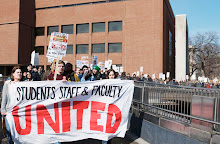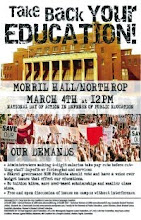On Tuesday, June 8, several FRPE activists met with Senator Cohen, who chairs the Senate Finance Committee and sits on the Senate Committee on Higher Ed. Below is our report.
***
In advance of Senator Cohen's arrival, we talked among ourselves about what issues we hoped to explore. These included the matter of tenure (frequently misunderstood outside academe as merely job security), the implications of the casualization of instructional (and research) labor, and the negative effects of precarity on the quality of education. A related concern is what "productivity" means: as long as the focus is on measurable outcomes, contingent labor looks like a good thing; however, progress in knowledge has nothing to do with "productivity" (not to mention "efficiency"). Accordingly, we must find ways to confute the instrumentalist argument for higher education, and we might hope Cohen could suggest how to frame this issue. Meanwhile, we also wanted to find out about the views that Cohen, his colleagues on the legislature, and their constituents hold of the U and of its faculty; what are the dimensions of the disjuncture between the U on the one hand and the legislature and the public on the other; is there, moreover, a disjuncture between the terms in which the legislators discuss this and the way they discuss it with their public(s)? Also, what does the higher ed committee do and how does it work?
Upon Cohen's arrival, after introductions we invited him to enlighten us on how the U is perceived at the Capitol. He first spoke in general terms of how successive presidents present the U to the legislature, and of the U's importance as the "economic engine" of the state. As to appropriations, being chair of the finance committee, he also outlined how target appropriations are set. We then steered away from the "economic engine" concept of the university, explaining that we believe it to be harmful to education and research in manifold ways. We brought up the differential budgetary allocations among colleges, the effects (practical and ideological) of rising tuition, the U's budget model, and the deployment of resources for new initiatives that putatively have economic promise at the expense of parts of the U that putatively don't; in this way disciplines that are most easily instrumentalized get supported while disciplines that are inherently non-instrumental are starved, despite their being essential to the U's core mission. Cohen received these ideas and data readily, disavowing the utilitarian notion of education (in particular higher education), and he expressed consternation at realizing that, through their tuition, students in the College of Liberal arts in effect subsidize the rest of the U.
Prompted by a question from Cohen about the search for the next president of the University, as well as other remarks touching on the faculty role in governance, we described how the faculty are excluded from any meaningful participation in governance; the University Senate has no real governance powers; and the faculty are given virtually no role in the presidential search. This apparently ran counter to what Cohen had assumed, though he commented that these issues are internal to the U.
We asked Cohen whether Governor Pawlenty's notion that "basic" university courses should be offered on line, rather than in classrooms, is widely shared among legislators. Cohen said it was not, and expressed incredulity that Pawlenty himself could really hold such a view.
Finally, we explored the idea of developing a program of faculty outreach to legislators and their constituencies, with a view to enriching and transforming the public debate over what the university is and does (likewise, more broadly, education). Cohen mentioned that there used to be fairly frequent meetings, often held in people's homes, involving legislators and faculty members -- many U of MN faculty live in his district, making it fairly easy to get people together. He wasn't sure how this practice was instigated or why it lapsed. He said legislators would gladly agree to recommencing such meetings, and suggested procedures for organizing the faculty to participate, but demurred somewhat with regard to constituent participation, especially beyond the Twin Cities.
As can be seen we never managed to raise certain of our principal concerns, despite the length of the conversation (more than two hours). Nonetheless, many issues got aired, and we as well as Senator Cohen came away from the meeting newly informed about them. Notably, our guest learned that the university administration does *not* represent the U or its faculty.
Saturday, June 12, 2010
Subscribe to:
Post Comments (Atom)


This kind of dialog between people who do the actual work of the University, unfiltered by the Morrill Hall Gang, is going to be essential if we are to enlist the aid of the legislature and the citizens to take back our public university.
ReplyDeleteAs Mark Yudof put it:
To the best of my recollection, no great scientific discoveries, no insightful social science tracts, and no novels have been produced in Morrill Hall.
No classes are taught in Morrill Hall. No patients are made well in Morrill Hall.
Help, or get out of the way!
Without authority invested where the real work of this University is done, the light of excellence will only grow dimmer.
University administrators have not yet cornered the market in acumen and foresight; a monologue will not suffice.
I'm very glad to find this blog and will follow your progress--especially with legislative outreach--intently! Wayne State's part-time faculty union has been able to bargain for several improvements, but waiting in the wings are these larger transformations that the forces of Hedge Fund U seem to want. If you're not already aware of it, there's an Adjuncts United march (anyone who cares about the future and quality of higher ed are invited to join us) planned as part of the opening march for the U.S. Social Forum on June 22 in Detroit. See www.uptf.org for flyers, more info. Social Forum (great event!) info: www.ussf2010.org. For more news, see http://www.theadjunctvoice.blogspot.com. Thanks for all you do!
ReplyDelete